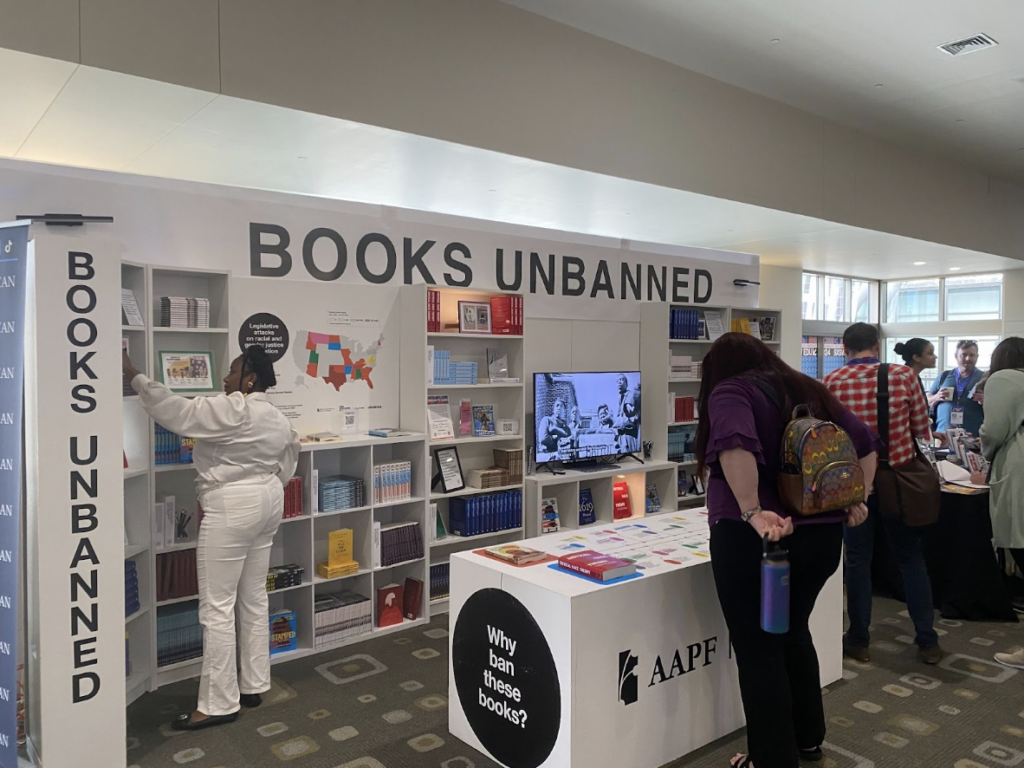Banned Books, Critical Race Theory and Literacy at SXSW EDU
Key Points
-
It’s essential to prioritize inclusive education that equips students with the tools to navigate and dismantle systemic inequalities, ultimately fostering empathy, understanding, and social change.
-
By taking proactive steps to fight censorship in schools, we can uphold the principles of academic freedom, foster intellectual diversity, and ensure that all students have access to a well-rounded education that prepares them for active and engaged citizenship in a diverse society.

SXSW EDU is a conference focused on culture. This year, persevering, sharing and proliferating culture emerged through conversations on critical race theory, book bans and literacy. Throughout the conference’s four days, we encountered numerous organizations dedicated to powerful conversations and diving deeper into these themes.
Critical Race Theory Takes Center Stage
While Critical Race Theory (CRT) has overtaken the media and become heavily politicized in recent years, this academic concept that examines race as a social construct is more than 40 years old. This year’s opening keynote “Unraveling Myths About Critical Race Theory in Education” explored the debate over CRT and unraveled myths and misconceptions that challenge the opposition and featured Dr. Kimberlé Crenshaw, Co-Founder & Executive Director of The African American Policy Forum and leading scholar of CRT, and Jonathan Cox, Vice President of the Center Policy Analysis & Research (CPAR) at the Congressional Black Caucus Foundation, Inc. (CBCF).
The conversation started with a light-hearted, five-question quiz to determine if the audience members held beliefs aligned with critical race theory (CRT). This approach brought the controversial topic into focus in a humorous and thoughtful way. The speakers then delved into the basics of CRT, emphasizing it as a recognition of historical and current injustices. They discussed the importance of incorporating CRT into academic and political discussions as a vital move toward justice. This integration is seen as a crucial step in upholding the constitutional rights of Black individuals and other marginalized communities.
“Not talking about racism does not destroy racism. Not talking about racism is a tool of racism.”
Dr. Kimberlé Crenshaw
CRT provides a framework for examining how systemic racism has shaped institutions and perpetuated inequalities in society. While 23 states—impacting 22 million school children—have passed legislation that limits the way race and racism can be taught, teaching CRT in schools can help students develop a deeper understanding of historical and contemporary issues related to race, privilege, and power dynamics. This knowledge empowers educators and students to critically analyze and challenge systems of oppression, ultimately fostering a more just and equitable society for all.
Anti-CRT legislation has been introduced in 46 states, but blocking CRT from being taught in schools not only limits students’ exposure to diverse perspectives but also impedes progress toward achieving racial justice and equality. It’s essential to prioritize inclusive education that equips students with the tools to navigate and dismantle systemic inequalities, ultimately fostering empathy, understanding, and social change. Tackling CRT and a few of the misconceptions surrounding it pulled attendees in and allowed them to see how their own actions, thoughts, and assumptions could and possibly should be stretched if we are truly in the business of being learners as so many of us profess.
Unrestricted Knowledge
In addition to anti-CRT legislation sweeping the nation, literacy and book bans also continue to be a locus of debate. According to data from the American Library Association (ALA), a record 4,240 unique book titles were targeted for censorship in 2023, a 65% increase over the 2,571 unique titles targeted in 2022 and a staggering 128% increase over 2021 numbers. Since many book bans are happening in states where CRT is being rejected, it is no surprise that 47% of the books targeted for censorship were titles representing the voices and lived experiences of LGBTQIA+ and BIPOC individuals.
The African American Policy Forum (AAPF) hosted a powerful installation called “Books Unbanned”. The interactive exhibit was stationed outside of the main auditorium to share the history of banned books, boost critical cultural literacy and to empower attendees to defend the freedom to learn, read, and teach history. AAPF provides free copies of titles such as All American Boys by Jason Reynolds and Brandon Kiely, This is Your Time by Ruby Bridges by Ruby Bridges, and The Handmaid’s Tale by Margret Atwood to attendees.
This exhibit exuded actionable ways to embed freedom to learn in community. The open shelves lined with both classic and contemporary titles were a powerful call to educators about the sense of urgency of protecting learners’ right to diverse and reflective reading options.
Unite Against Book Bans held a session titled “How to be a Freedom Fighter,” with author Angie Thomas (whose novel The Hate U Give has found its way on banned book lists), a student advocate, a librarian, and community organizer where they examined how censorship harms communities and threatens democratic principles. Attendees learned proven ways to engage their communities, defend intellectual freedom, and support educators and librarians.
In addition to those featured at SXSW EDU, several other organizations have collaborated to help educators and community members fight book bans locally and nationally:
- PEN America has accumulated important data, resources, and a place to report book bans in your community.
- The National Council of Teachers of English (NCTE) developed This Story Matters, a book rationale database where you can search for and contribute rationales for banned books.
Spencer Russell led another standout keynote illuminating the dire condition of the nationwide literacy crisis. Out of the gate, Russell delivered a sharp blow by sharing that over two million students in 4th grade are reading below grade level and how it will impact their formal learning experiences, career choices, and America as a whole. Crescendoing, Russell shared the number of adults who read below a 3rd-grade reading level (the number? 52 million!). Russell’s passion for literacy started after he learned some hard lessons as a teacher. It motivated him to empower caregivers and parents in their own literacy journeys and for young people. He created Toddlers Can Read, where he provides resources to support literacy development.
The keynote offered five short ways to make a difference in the lives of anyone who wants to support developing a more literate world. In the event you don’t have time to watch the powerful address, here are the steps:
- Know the research
- Stop theorizing, start teaching
- Keep it simple
- Partner with parents/caregivers
- Get started now
Protect Literacy and Learning
Fighting censorship in schools requires a collective effort to uphold the principles of academic freedom and intellectual diversity. When facing challenges such as book bans and anti-CRT legislation, there are several proactive steps that educators, parents, and advocates can take.
- Education and Advocacy: Educate the community about the importance of diverse perspectives in education and the harmful impacts of censorship. Advocate for policies that promote intellectual freedom and inclusive curricula.
- Engage in Dialogue: Foster open and constructive dialogue with stakeholders, including school boards, administrators, and policymakers. Highlight the value of exposing students to a variety of viewpoints and critical thinking skills.
- Defend Access to Information: Oppose book bans and challenges to educational materials by defending access to diverse literature and resources. Support librarians and educators in their efforts to provide students with access to a wide range of ideas and perspectives.
- Mobilize Support: Build coalitions and mobilize support from community members, educators, and organizations that value intellectual freedom and equity in education. Work together to oppose censorship efforts and promote inclusive learning environments.
By taking proactive steps to fight censorship in schools, we can uphold the principles of academic freedom, foster intellectual diversity, and ensure that all students have access to a well-rounded education that prepares them for active and engaged citizenship in a diverse society.







0 Comments
Leave a Comment
Your email address will not be published. All fields are required.